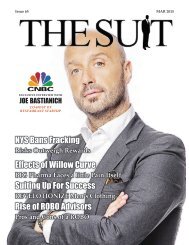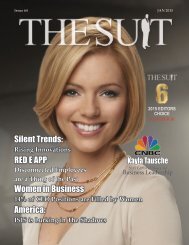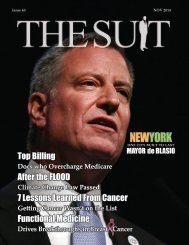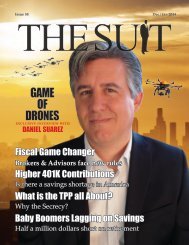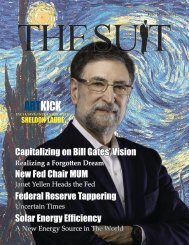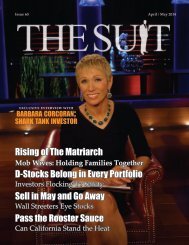o_19grqq7snim9mn019q11f7ds26a.pdf
Marcus Lemonis, a serial entrepreneur and host of the show “The Profit” on CNBC, is a true survivor in the corporate world. The native-born Lebanese business man endured the chaos of a civil war in Beirut and eventually moved to Miami. Lemonis was exposed to the automotive industry throughout his upbringing - his grandfather owning two of the largest Chevrolet dealerships in the United States and Lee Iacocca serving as the family friend and later mentor to Lemonis. On page 12, we conducted an interview with “Profit” host Marcus Lemonis, who offers struggling small businesses capital investment and his expertise in exchange for an ownership stake in the company. In the latter part of the magazine, we interviewed countless wealth advisors during these tough economic times. We recognize that some of the changes in 2013 and 2014 require relevance for financial planners. Therefore, the financial industry continues to push for more realistic standards and reforms.
Marcus Lemonis, a serial entrepreneur and host of the show “The Profit” on CNBC, is a true survivor in the corporate world. The native-born Lebanese business man endured the chaos of a civil war in Beirut and eventually moved to Miami. Lemonis was exposed to the automotive industry throughout his upbringing - his grandfather owning two of the largest Chevrolet dealerships in the United States and Lee Iacocca serving as the family friend and later mentor to Lemonis. On page 12, we conducted an interview with “Profit” host Marcus Lemonis, who offers struggling small businesses capital investment and his expertise in exchange for an ownership stake in the company. In the latter part of the magazine, we interviewed countless wealth advisors during these tough economic times. We recognize that some of the changes in 2013 and 2014 require relevance for financial planners. Therefore, the financial industry continues to push for more realistic standards and reforms.
Create successful ePaper yourself
Turn your PDF publications into a flip-book with our unique Google optimized e-Paper software.
y a. marie velthuizen<br />
One Uniform Standard Does Not Fit All<br />
In late March 2014, the SEC promised to speed up its decision-making process regarding the establishment<br />
of a national uniform fiduciary standard of care governing all financial advisors – registered investment<br />
advisors and broker-dealers alike. Yet not all players in the financial services industry are waiting with<br />
bated breath for this to happen. Some – particularly those identified as registered investment advisors<br />
(RIAs) – aren’t convinced that uniform standards are inherently in the best interest of investors.<br />
David Edwards, president of Heron<br />
Financial Group | Wealth Advisors,<br />
is one of those RIAs with concerns<br />
regarding the establishment of a onesize-fits-all<br />
fiduciary standard.<br />
“The nuances of the application of<br />
the uniform standard are not apparent<br />
to most Americans – or indeed to most<br />
regulators and politicians,” Edwards<br />
said, which is why he travels often to<br />
Washington, D.C. to explain the issues<br />
to members of the Senate and House of<br />
Representatives, and their staff.<br />
Financial advisors such as Heron Financial<br />
Group are regulated by the Securities<br />
& Exchange Commission (SEC)<br />
and adhere to the provisions of the<br />
Investment Adviser Act of 1940. This<br />
Depression-era federal law created a<br />
“fiduciary standard” obliging RIAs to<br />
select only the best possible investment<br />
opportunities for their clients.<br />
Broker-dealers have a different relationship<br />
with clients. Broker-dealers<br />
follow a “suitability” standard which<br />
may or may not best provide for the<br />
investment needs of the client. These<br />
advisors are governed by the Financial<br />
Industry Regulatory Authority (FIN-<br />
RA), which is a self regulatory organization<br />
(SRO) authorized by Congress –<br />
but not an official part of government.<br />
Edwards explained, “A broker-dealer<br />
can offer his client several similar<br />
investments, which may have no, minimal<br />
or high commissions. The broker<br />
dealer is NOT obligated to select the<br />
no-commission investment and indeed<br />
may recommend the highest cost op-<br />
THE SUIT MAGAZINE - JULY 2014




